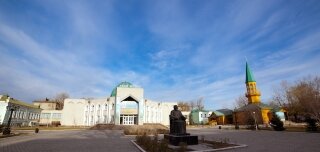Museums
House-museum of Shakyr Abenov
The house-museum of the poet Shakir Abenov was opened in Kundyzdy area of the East Kazakhstan region in 2003. The museum was opened in the real house of the poet built in 1962. The famous Kazakh poet had lived in this very house for many years since the beginning of the 60s until his death in 1994. Several years ago, the house-museum was thoroughly renovated. After the restoration the museum got a chance to present its visitors refreshed literary and memorial exhibition. Since the poet occurs to be our contemporary the museum has very large collection of original artifacts. After the death of the poet, all the personal belongings - clothing, household items, house utensils, as well as manuscripts, library, correspondence were transferred to the reserve fund of the State Museum of Abay. The house museum of Shakir Abenov is a branch of the State Reserve-Museum of Abay. That is why, the exhibition is made up of these funds. All the basic principles of modern literary museums were complied with in preparation of the exhibition.
The exposition of the museum begins with a hall dedicated to the poem "Kozy-Korpesh-Bayan Sulu", this poem holds a special place in the poet's work and rightly brought to him a nation-wide fame and recognition. The visitors of the museum can see the main characters of the poem at the entrance to the hall: Kozy-Korpesh and Bayan Sulu, whose figures occupy the central portion of the first floor. Literary material introduces the history of the creation of the poem, the manuscript and the first edition – Sh. Abenov’s poem "Kozy-Korpesh and Bayan Sulu" was published in Almaty in 1938. The exposure continues introducing the visitors the poet's creative laboratory based on original materials presented in thematic and chronological order. Here you can see manuscripts, diaries and personal correspondence of the poet. In addition the museum has many exhibits reflecting the literary life of that epoch- photos of contemporaries, books, memories of his friends. The materials revealing Shakir Abenov’s activities as composer and singer are well presented, there are traditional Kazakh musical instruments on the stands of the museum, including those that belonged to the poet. The memorial part of the exhibition is presented in some rooms, here you can come across interesting exhibits characterizing the hard and modest life of the poet. Memorial objects reproduce the interior of his working and rest rooms. His personal belongings appeal the visitors: dombyra and household items made by the hands of the poet, the watch, the Order of "Friendship of Peoples" and medals, and photographs of the family life of the poet. The documentary evidence of perpetuation of the memory and the literary heritage of the national poet Shakir Abenov supplements the exhibition.
Abenov Shakir was born in Kundyzdy area, Abay district, EKR, March 1, in 1901. Childhood and early days of the poet were spent in the family of an influential feudal and Hazhy Aben Bitimbaev, a well-known contemporary of Abay. At the age of 7, Shakir learned to read and write from the aul mullah. Then a young boy is sent to Semipalatinsk and he enters the Russian parish school, where he studies for 3 years. Next, on the insistence of his father, he goes to study at "Galia" medrese in Ufa. The poet gets secondary education, and further Sh.Abenov improved his knowledge independently and educated himself throughout his life. He was raised in literary circles, his countrymen were poets – successors of the tradition of Abay – Shakarim, Kokbay Zhanatayev, Arip Tanirbergenov, Uais Shondybaev, Abay’s sons - Akylbay, Magauiya, Turagul and many others. The beginning of Shakir Abenov’s creative activity was the distant and hard 1916, it was then when the magazine "Aikap" had published his first poems. Shakir Abenov’s satirical writings deserve special attention in his great creative way. Successful comparisons, keen definitions of the poet handed down a legend immediately, and, made his name popular. In these very years, he met the famous Kazakh poet Sultanmakhmut Toraigyrov, and knew many of his works by heart.
Shakir Abenov was a great connoisseur and collector of Kazakh folklore and works of poets of the past centuries: Sabyrbay, Dulat, Tubek, Janak. Subsequently, he wrote vivid examples of folk art by hand and gave them to the literary section of the Academy of Sciences of Kazakhstan. In the 30s Shakir Abenov worked as a literary secretary of Zhambul Zhabayev for some time.
- Tell your friends:
Other Museums
Museums
The East-Kazakhstan regional museum of history and local history.
The East-Kazakhstan regional museum of history and local history is one of the oldest museums in the republic. It was founded in 1915 under People's House. Collections of local students of local history became the base of the museum.

Museums
House-museum of Abay Kunanbayev
The house-museum of the great Kazakh poet Abay Kunanbayev was first opened in 1940 by decision of the Soviet People’s Commisioner of KazSSR in honour of 95th anniversary celebration since the birth of the poet. Initially it was located in the house of Bekbay Baisov, and then from 1944 to 1967 it was in the house of Aniyar Moldabayev.
